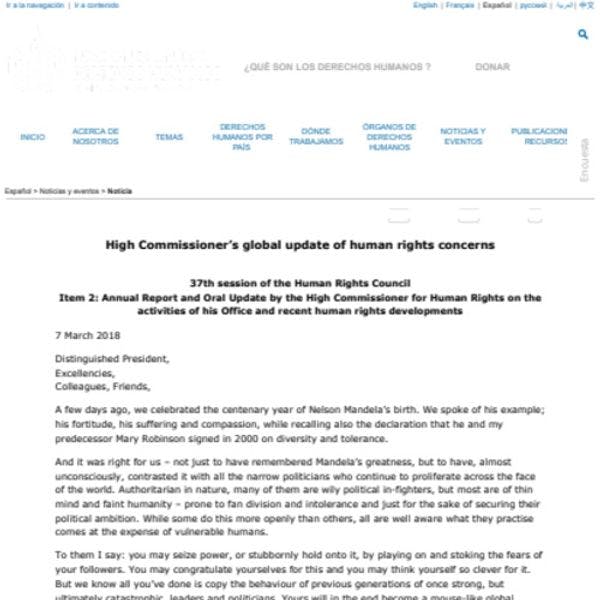High Commissioner's global update of human rights concerns
Since my last update to this Council I have conducted missions to Libya, Peru, Uruguay, El Salvador, Guatemala, Indonesia, Papua New Guinea and Fiji. Recognising that not all States will accept a visit, I express my deep appreciation for these invitations, which demonstrate commendable openness to discussing human rights issues. In my statement to the Council in June, I will be addressing the issue of refusals of access to international human rights mechanisms, and to my Office. In every instance, I encourage the concerned States to embark on deeper dialogue and cooperation with my Office and the human rights mechanisms. Before I begin what will sadly prove to be a very long list of human rights violations and abuses, I would like to highlight a sample of advances which are underway in several countries.
In the Philippines, following the International Criminal Court’s announcement of plans to open an investigation, the authorities announced their willingness to work with the UN on drug-related challenges. I deplore the President Duterte’s statement last week to élite police units that they should not cooperate “when it comes to human rights, or whoever rapporteur it is” and the continued vilification of this Council’s Special Rapporteur on extra-judicial killings by the authorities. The Government has a duty to uphold human rights and to engage with persons appointed by this Council. I am concerned by deepening repression and increasing threats to individuals and groups with independent or dissenting views, including opposition Senators, current and former public officials, the Commission on Human Rights, human rights defenders and journalists. Several cases for impeachment or dismissal have been launched against members of the Supreme Court, the Office of the Ombudsman and other institutions representing democratic safeguards. Senator de Lima has now been arbitrarily detained for over a year, without clear charges. This authoritarian approach to governance threatens to irreparably damage 30 years of commendable efforts by the Philippines to strengthen the rule of law and respect for the human rights of the people. I further deplore President Duterte's encouragement to troops to violate fundamental rules of international humanitarian law, including his statement that they should shoot women fighters in their genitals because this would render them "useless".
More broadly, I urge all States to examine the effectiveness and human rights impact of their current approaches to the so-called “War on Drugs”. I urge more comprehensive implementation of the Outcome Document of the United Nations General Assembly Special Session on the World Drug Problem of 2016, including its 15 operational recommendations on human rights and related issues. The cross-cutting UNGASS 2016 approach constitutes a new and better linkage of the objective of drug-control – protection of the health and welfare of humanity – with the key priorities of the UN system, including the SDGs. I encourage the continuation of this structure for future UN drug policy debates. In this context, I note and commend the International Narcotics Control Board's recent call to all States to implement international drug control conventions in accordance with their commitments to human rights treaties and the rule of law.
Downloads
Regions
Related Profiles
- United Nations
